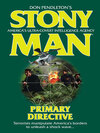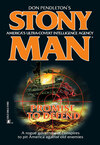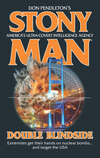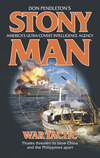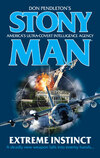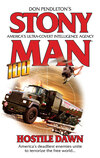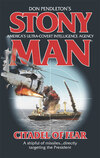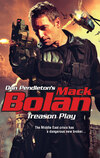Читать книгу: «Primary Directive», страница 2
“I assume we’re clear to do whatever we have to on this one?” Lyons asked.
“Unequivocally,” Brognola said. “Find out what’s going on and act appropriately, but be as judicious as you can. We don’t need any bloodbaths down there if we can avoid it.”
“They started it,” Lyons said, and disconnected.
“Now what?” Blancanales asked.
“I guess we won’t really know until we get there,” Lyons replied. “See if we can find some clues from whatever pieces they left behind to pick up.”
“You think those were terrorists crossing onto U.S. soil?”
“I’d wager my next paycheck on it,” Lyons replied.
He turned to Schwarz. “How we fixed for armament, Gadgets?”
“We’re good. Kissinger packed all our usual fare, plus a little extra just in case.”
“I’d say this qualifies as a ‘just in case’ moment,” Blancanales said.
Lyons grunted his agreement. This smelled of a terrorist plot from the get-go and Lyons could feel a conspiracy at the very center of his gut. The al Qaeda terrorists had been spouting off for years about launching another catastrophic attack against America, and maybe they saw their chance in the recent tensions between Mexico and the U.S. concerning illegal immigration. Leave it to a pack of radical terror-mongers to exploit an already hot issue. There were issues about the 9/11 attacks that had driven wedges between the divisions on issues totally unrelated to al Qaeda and its unquenchable hatred for the United States and her allies. Why should this be any different?
Well, it would be different in one way. This time Able Team and Phoenix Force would be prepared for it. This time they’d be waiting for al Qaeda to make its move. And when it did, the terrorists would encounter a force unlike any they had faced before.
CHAPTER THREE
The men of Phoenix Force stepped onto the tarmac of the heliport in Gamboa as the blades of their Sikorsky H-19 wound down. The humid air brushed over them like oil paint on a canvas and the mugginess made it difficult to breathe.
A man with a long, thin nose and bushy mustache stood at the edge of the tarmac wearing a lightweight linen suit of white over a pink silk shirt and a wide-brimmed hat. The first thought that came to McCarter’s mind was that of Panama Jack, and as he drew closer to the man he noticed the facial features only reinforced his first impressions. The ends of the man’s mustache tapered off curlicue style and he had a smooth, swarthy complexion with mild crow’s-feet.
“Mr. White?” The man spoke English with a heavy mestizo accent. He extended a hand and McCarter shook it. “Robert Nativida. I am the Panama province secretary of the interior to President Espino.”
“Pleased to meet you,” McCarter replied easily. He introduced the others in turn by their aliases; they shook hands all around.
“Welcome to Panama, gentlemen. If you’ll follow me, please.”
Phoenix Force accompanied Nativida to a pair of Jeepneys waiting at the edge of the road. McCarter took one with Encizo and Nativida, while James, Hawkins, Manning and their driver manned the other. They turned onto a road that led from the heliport and headed in a westerly direction.
“Where we going?” Encizo asked casually.
“There is an activity center near here,” Nativida replied over his shoulder from the front seat. “I will need to stop there and pick up some important documents. I apologize for running errands but as I’m sure you’re aware we’re trying to keep up appearances and this information deserves my attention.”
“No need to worry the tourists, eh, mate?” McCarter gibed.
Nativida nodded emphatically. “Precisely. From there, we will take you to the hotel. We have rooms booked for you at the Historical Villa. The apartments there are adjacent to the main resort. We assumed you would wish to be as inconspicuous as possible.”
“You assumed right,” Encizo replied.
“Although we’d like to see the site of the engagement first, if it’s all the same to you,” McCarter added.
“We can arrange that,” Nativida said.
They arrived at the activity center and Nativida ran inside. McCarter and Encizo could hear the buzz of unstilted dialogue between their comrades in the other Jeepney. McCarter couldn’t make out what his friends were saying but he trusted their professionalism and abilities to be discreet in their subject matter. Nativida returned a minute later with a large accordion binder in his hand, climbed into his seat and ordered the convoy to proceed.
They rode to the riverside docks in silence. When they arrived, a boat awaited them and all of the men save for the drivers climbed aboard. Nativida spoke briefly under his breath with the captain, then they set off on a journey along the river. Under other circumstances it would have been a nice, leisurely boat tour, but in this case grimness weighed on the minds of the Phoenix Force veterans as they considered the aftermath of the violence that had occurred here less than forty-eight hours ago.
They rounded a deep bend in the river, which Nativida identified as the Chagres, and off to their left the river opened onto a wide body of water. Nativida gestured to it and said, “That’s Gatun Lake. And over here is where Lieutenant Horst and his men encountered the alleged submarine.”
“Why do you put it that way?” James asked.
“Excuse me?”
“You said ‘alleged,’” Encizo said. “As if for some reason you don’t believe what they reported.”
Nativida seemed a bit embarrassed by their retorts. He smiled and said, “Gentlemen, as you can probably see, the water is very shallow here and it was still rather dark. We cannot be sure that it was an actual sub they saw.”
“That’s funny,” Hawkins said. “Because we heard the tape of their final communications, and I’m pretty sure I heard ‘submarine’ real clearly.”
McCarter noticed Nativida suddenly express defensiveness and decided to step in with some damage control. “It doesn’t really matter what kind of boat it was. The point is, there’s no mistaking their intent or the fact they were hostiles.”
“Right,” Manning agreed. “What we should focus on now is who and why.”
“I’ve been giving that some careful thought,” Encizo said. “I don’t think any one of us would disagree that whoever attacked that boat crew did so because they were surprised. Obviously they weren’t expecting the crew to be there at that particular moment.”
“Meaning they had probably been watching the place for a time,” James concluded.
Encizo nodded. “And now seeing the location where it happened, it seems pretty apparent they were here to move one thing, and it wasn’t drugs.”
Hawkins furrowed an eyebrow. “How do you know that?”
“Look at that spot,” Encizo replied, jerking a thumb at the site. “They had to have been a good forty meters or so offshore. And if we assume this was a sub, they would have been surfaced. Seeing as there aren’t any docks here, boys, I have to wonder exactly how they would have off-loaded drugs or any other type of contraband for that matter.”
“What about a boat?” Manning asked.
“No dice, mate,” McCarter answered. “The intelligence reports said the local authorities arrived within ten minutes after the shooting started.”
Manning tendered a conciliatory nod. “There wasn’t time.”
“Maybe they never even got that far,” James proposed.
“Doubtful,” Encizo said. “They took a great risk getting in here, and I can’t believe it was solely for reconnaissance purposes. I think the more plausible explanation is that whatever they dropped here didn’t require any mode of transportation other than the sub. In other words…”
“People,” McCarter concluded.
“So this was a personnel delivery of some sort?” James asked.
“In the lack of any other evidence at this point,” Encizo replied, “it seems like a logical conclusion.”
Manning crossed the boat and leaned close to McCarter’s ear. “What do you have in mind for our next move?”
“Let’s get to the apartments,” McCarter replied. “This CIA liaison should be waiting for us there. I want to get his take on all of this.”
Manning nodded and stepped off just a second before something caught McCarter’s eyes at the edge of the bank, maybe ten yards distant. He knew the movement of the tall grasses and flowers along the shoreline was anything but natural.
“We’re being watched,” he whispered. “About two o’clock. Tell Nativida to have the pilot head in that direction. Easy, though. I want to look like we’re going past.”
Manning nodded and immediately walked next to where Nativida stood very close to the cockpit. He didn’t turn to look at the man, simply kept his eyes straight ahead while he delivered McCarter’s message. The Phoenix Force leader turned and walked to where James and Hawkins sat on a bench mounted to the port side of the boat. He sat between them and fished a Player’s cigarette from a pack. He lit it, bent at the waist as if stretching, and whispered, “We got a watcher, mates. Follow my lead.”
McCarter then stood and looked in Encizo’s direction. Manning had just taken a seat next to him and the Briton could barely see Manning’s lips move as he delivered the message. Encizo’s eyes flicked in McCarter’s direction long enough to assure McCarter he knew the plan.
The Phoenix Force leader turned to face the prow of the boat and propped his right leg on the edge. He ground his heel down, flexing his thigh muscles in preparation for the jump. He hoped to make it close to the observation point by the first leap, although he didn’t yet have a measure of how deep the water would be there. Based on what he saw, he assumed it would come up to at least his knees.
The Briton took another drag of the cigarette and let the smoke curl from his nostrils as he made a point of flicking it high in the air just as the boat chugged parallel with the target landing point. McCarter hoped the observer’s eyes would track the path of the cigarette long enough for him to reach the guy. A moment after it left his fingers, McCarter jumped. He landed much closer to shore than he’d originally anticipated, the water coming only past his boots. The Briton gained two steps and then crashed through the brush just as his quarry got to his feet.
McCarter took the offensive and delivered a roundhouse kick that connected, although he lost a bit of force as he wrenched the knee of his planted leg in the spongy ground. His opponent took the kick in the ribs, grunting with pain on impact, but then managed to get an arm wrapped around McCarter’s calf and trap the leg. The guy turned inward and jammed an elbow in McCarter’s knee, but not being fully planted himself, the blow was weak and saved the Phoenix warrior’s leg from debilitating injury.
McCarter leaned in full-force, grabbed fistfuls of the man’s collar and then pulled back, a move that took his enemy off balance. The Briton landed in a backward shoulder roll and used the impetus of his weight to bring his opponent with him in a Judo sacrifice throw that sent the man sailing overhead and into a nearby tree trunk.
Encizo and Manning crashed through the brush a moment later, both panting with the exertion. They immediately took control of McCarter’s opponent and wrestled him to his feet. The Phoenix Force leader looked into the man’s dark eyes for a moment.
And a mask of pure hatred stared back at him.
“H IS NAME’S Siraj Khatri,” Barbara Price said.
The men of Phoenix Force were gathered in one of their two apartments. The speakerphone echoed in the room but they were the only ones in that particular unit, so being overheard was hardly of concern. Not that the Panamanian government didn’t have the phones tapped anyway. For all they knew, half the cabinet could be listening in right at the moment.
“He’s a native of Pakistan,” Price continued. “He was born and educated there, although he did do a year on an exchange program at UCLA back in 2004.”
Lounging on a love seat with his leg propped and his knee on ice, McCarter replied, “Any known terrorist affiliations?”
“None we know of,” she said. “He returned to Pakistan as scheduled and completed his final year of schooling there as a software programmer. Then he just seemed to disappear until surfacing again in Mexico a few months ago.”
“What for?” Encizo inquired.
“He took a programming job there, apparently for some start-up company. Telemarketing and call center services of sorts, serving locations in both North and Central America.”
“Well, he’s a long way from Mexico,” Hawkins pointed out.
“Barb, do we have any other information on this guy?”
“I’m afraid not,” Price said. “Apparently he has no credit cards and no other links we can follow. Both parents were killed accidentally in 2002 during a shooting incident that occurred on the Afghani-Pakistan border during the very early phases of Operation Freedom. They were apparently Muslim missionaries of some sort.”
“Well, that would surely give him a motive to seek out al Qaeda,” Manning remarked.
“We also have some news to report,” Brognola chimed in. “It concerns Able Team’s mission in Texas. It appears there was a breach of the border a couple of hours ago, and one of the crossers had an Arabic symbol tattooed on his hand. It looked familiar to me but I couldn’t place it at first. It took us some time but we finally identified it after Aaron ran it through the database. The symbol dates back to a tattoo fire-branded onto the arms of mujahideen fighters meaning ‘struggle.’ They wore this during the liberation of Afghanistan from the Soviets.”
“Too bloody right,” McCarter replied. “A liberation movement that received plenty of manpower and funding from bin Laden.”
“And we’re back to al Qaeda,” James said.
“We’ve just passed the information on to Able Team, so they’ll be running this down from their end. Two things we know for sure now, though, are that terrorists have entered the country and that this most recent incident with Panama must contain a link. There’s no way these were coincidences.”
“Rafe has developed a pretty good theory about that,” McCarter said. He looked at the Cuban and said, “You want to elaborate?”
Encizo ran it down for the Stony Man logistics crew, including his theory about the sub being in Panama to subsidize terrorist personnel requirements, and concluded with, “I’m guessing this is some sort of pipeline.”
“Sure,” Brognola agreed. “Plant Islamic radicals in Central America to set up connection points, then smuggle in personnel and feed them up the chain into America using the illegal immigration network. It’s nothing short of brilliant.”
“Well, al Qaeda’s been harping about something big, bigger than the attacks in New York and Washington, for years,” Hawkins pointed out. “It seems to me this would qualify.”
“And they would certainly need a lot more players to top 9/11.”
“They’re holding this guy under armed guard by the locals right now,” McCarter stated. “Since he’s obviously in the country illegally, they’re telling us this falls to the jurisdiction of the Panamanian government.”
“Yeah, what’s the deal with that, Hal?” Hawkins said. “I thought they wanted our help.”
“I’m not sure, guys, but we’ll get on it immediately. You’ll get their cooperation one way or another, I guarantee it.”
“What about your CIA contact?” Price asked. “Have you met with him yet?”
“Not yet,” McCarter replied. “We—”
A steady rap at the door cut him short.
“Speak of the devil, that’s probably him now.”
McCarter nodded to Manning, who crossed the room to answer the door, James on his heels as backup. They were probably secure in this location but in light of recent discoveries that might point to the fact the place was crawling with al Qaeda terrorists, there wasn’t any point in taking chances.
Manning opened the door after verifying James was in position and stood aside to admit a tall, well-dressed man with short red hair and a strong jaw. The man’s gray eyes darted from man to man, and he took in the entire room with a natural pause. He didn’t wait but a second before he began speaking.
“Hey, fellas,” he said in a deep, scratchy voice with a Southern twang. He tossed a salute and said, “The name’s Herndon. I’m with the Panama desk.”
Their CIA contact.
“We’ve been waiting on you,” McCarter said tightly. “You were supposed to meet us here over three bloody hours ago.”
“Yeah, sorry about that. I got held up.”
Before anyone could reply, Nativida burst into the room with a flushed face and sweat soaking through all the usual places on his nice suit.
“Gentlemen, please come now! The man you captured is about to escape!”
CHAPTER FOUR
It didn’t take long for Able Team to find the bodies of the two immigrants who’d been shot. As soon as they arrived, the trio took charge and formed a skirmish line. Two sheriff’s deputies located the bullet-riddled pair nestled between a large patch of sagebrush. Able Team ordered the teams to continue walking their skirmish line to search for any clues while they checked the bodies for identification. To no one’s surprise, they didn’t find any.
“No doubt they’re Hispanic, though,” Blancanales said as he eyed the grim scene before them.
Lyons looked up and squinted at the hills to the north as if the solution to this mystery might be hidden somewhere among them. “Okay, so we have bogus Border Patrol agents killing Mexican immigrants, and Arab terrorists, possibly al Qaeda, crossing into the U.S. unmolested. That makes no sense.”
“It would if we were to assume these two were the coyotes,” Schwarz replied.
“What?”
“Sure, think about it. Al Qaeda decides to use the Mexican pipeline to funnel terrorists into the country. It wouldn’t be difficult for Arabs to pose as Mexicans. They train them in the language, mark them up so the receivers on this end can sort out the wheat from the chaff, as it were, and there you go! An instant, nearly endless supply of bodies to assist in preparation for whatever operations they have under way.”
“It would be a pretty ingenious plot if you really think about it,” Blancanales added. “U.S. Immigration is so backlogged that they have to pass off a good amount of the scutt work to Border Patrol and local police agencies. Mostly they treat this problem like a day of fishing on the lake. Get one you don’t want, you just throw it back.”
Lyons nodded in understanding. “And they only take the most basic information in these roundups, so they can more quickly identify them if they return.”
“Right. This means we’d only be helping them build their identities as Mexican nationals.”
“It’s a ready-made recipe for deception,” Schwarz observed.
Lyons folded his arms. “So let’s assume for the sake of argument that al Qaeda’s cooked up a plot to use the Mexican immigrant system to smuggle operatives into the country. And let’s also assume they got caught with their pants down in Panama. Moving any kind of operation force across that many miles of jungle is risky, at best, not to mention the costs involved.”
“Not as risky as trying to sneak them straight into the country by more conventional methods,” Blancanales said. “You’re forgetting it’s a lot easier for them to get operatives with Muslim backgrounds into Central American countries than North American. They aren’t running planes into skyscrapers and bombing federal buildings in these countries, so officials feel they have much less to worry about from Islamists.”
“Nobody’s immune to the horrors of terrorism,” Lyons said.
“Yeah, sure, but tell that to these poor starving Mexican nationals when the terrorists are waving plenty of cash around. What we make in a month would take many of those people years to earn, Ironman. You should know that as well I do.”
“All right,” Lyons said. “But we need a place to start looking. If al Qaeda’s behind this, then its headquarters has to be close by. Question now is, how do we find them?”
Schwarz stuck up his hand. “I think I might be able to answer that one.”
F ADIL B ARI WATCHED the crowd of American policemen through binoculars from his vantage point in the nearby foothills. A couple of times he had to caution his men to be silent as they waited. Additional reinforcements had arrived, and they were scouring the dry, dusty flatlands, probably looking for signs that would assist them in picking up Bari’s trail. They wouldn’t find any. The man hadn’t built his reputation by being careless and unthinking.
Bari watched for another minute, then crawled behind a large boulder. Two of his crew waited there, watching him expectantly.
“They are still down there,” he told them. “I’m concerned they might spot us if we attempt to leave, yet we cannot hold here indefinitely.”
“What if we wait until dark?” one of the men asked.
Bari considered that a moment, then shook his head. “This will only give them more time to bring in additional personnel and equipment. I may not like it, but we should move now. Waiting only increases our chances of being cut off from the base.”
The men nodded, then all three of them crawled to another area where their six new arrivals waited.
Bari hadn’t counted on the Americans moving their construction project along as fast as they had. Many of al Qaeda’s connections had done everything they could to delay it. They had lobbied or bribed every politician and every leader of every special-interest group from the American Southwest to Washington, D.C. They’d also tried to infiltrate the scientific community, figure out exactly what the secret project called End Zone had to do with the construction of the border wall, but those attempts proved unsuccessful. Even their contacts inside the American press couldn’t figure out exactly what was happening until recently.
The cell leader and his men rallied the new arrivals and began the arduous trek over nearly half a mile of uneven terrain to reach the half dozen 4x4s that awaited them beneath heavy camouflage made with netting and natural elements. From that point, they would travel the twenty-odd miles to a natural lava flow along the area called Mt. Riley that had carved a belowground cavern converted to quarters for Bari’s cell.
Nearly four hours elapsed before the terrorist leader and his tired crew entered the comparative coolness of the rocky operations center. He ordered his men to point out sleeping accommodations for the six new men, and then get them cleaned up and fed. That attended to, he walked across the cavern and into a separate antechamber carved by the movement of superheated lava thousands of years before.
The chalky remnants of soot made it almost impossible to keep their computer equipment clean. Two of the men assigned to the operation were computer experts. The pair had hacked into a nearby cellular tower and used it to establish a wireless broadband connection. They had been using this to communicate with their support units around the globe via various Web site and e-mail servers used to deliver pornographic spam. Because those servers delivered thousands of e-mails an hour, it made it harder for U.S. security systems to sift through them to find the ciphers and other hidden code behind photographs. Al Qaeda’s specialists had found pictures of naked women and “legitimate” porn sites to be perfect methods for cryptic communications due to the sheer number of hits even one of those sites received in a single twenty-four-hour period. The computer specialists looked up when Bari entered. He nodded in way of acknowledgment.
“What have you discovered?” he asked.
Amer Rajiya, younger of the pair, replied, “It would seem the Americans are in the final testing phases of End Zone. It appears the system is designed to monitor the border wall and send information to their border patrol units. Additionally, the system also has some type of antipersonnel feature to it.”
“What kind of ‘antipersonnel feature’?” Bari demanded.
“We are not yet sure,” said Jainal Hapilon, a former member of the Abu Sayyaf. “But we know that it is capable of neutralizing our agents for an indefinite period of time.”
The news was anything but good. The operation wouldn’t be any easier from this point, and without proper support they might not be able to execute it at all. Everything relied on an adequate number of personnel, since the attacks required split-second timing and they wouldn’t get a second chance if they didn’t execute the plan in the proper places and under the proper timing. Bari didn’t believe in contingency plans. Missions for God were typically one-way missions, missions of sacrifice, missions of martyrdom. Bari had planned this one to the last detail—he knew he most likely wouldn’t survive.
“This is a disturbing development,” he told them. “We cannot move forward with our plans if we do not have everyone in place. We need to get word back to our people that we may experience a delay. As soon as you have done that, gather the team leaders together here for a conference.”
“What are we going to do?” Rajiya asked.
“What else can we do? We must destroy this technology and those who created it before it becomes fully operational. All else depends upon it!”
“I T’S KNOWN AS LANTIRN,” Aaron Kurtzman announced to Brognola and Price.
They were gathered in the Annex Computer Room and viewing a complex schematic of an electronic device projected on the massive LCD screen in front of them.
“That stands for Low-Altitude Navigation and Targeting Infrared System for Night. The Air Force originally used it on their F-15 and F-16 fighter craft, but it always had the ability to be retrofitted to any system with a military-grade digital multiplexer.
“The radar system inside of it operates at an altitudinal range of ten to one thousand feet, so fauna won’t give it any problems but it will track anything above that. Since the wall’s twelve feet in height, it’s easily capable of tracking any object that comes over. Additionally, it uses laser-range finder technology to create 3-D models of the terrain. Any deviation above a certain nominal limit will trigger the system into remapping. This will automatically tell the monitoring system what deviation has been detected and the most likely cause of the deviation, be it human, animal or otherwise.”
Brognola nodded. “Impressive.”
“Not as much as this next part,” Kurtzman said with a wicked grin. He tapped the keyboard to display a picture of an oval-shaped device mounted to a section of border wall. “We got this photograph courtesy of Gadgets.”
“Looks like one of those giant golf balls you see on the top of some pro shops,” Price noted.
“It may not look that impressive, but believe me when I say it’s quite the little gadget. What you’re seeing here is merely the outer shell. It’s originally based on the MPQ-54 Forward Area Alerting Radar first put in production back in the early 1970s. Although it’s had a number of impressive modifications through the years, including a brand-new computerized interface, the core technology is still the same. It’s been enhanced with the Firefinder family of ground radar systems, originally used to locate mortars and other ground-based artillery emplacements. A favorite of military tankers and engineering units.”
“How does it work?” Brognola asked.
“It’s pretty similar to its predecessors but again, lots of neat mods. It uses pulse-Doppler range gates to paint a three-dimensional picture of some given area, in this case a section of the border wall. The beam is translated via servomotors capable of scanning a 120-degree sector ten times per second. When combined with the other systems, the radar network it provides becomes virtually foolproof.”
Price raised her eyebrows. “Virtually?”
Kurtzman shrugged with a sheepish grin. “No system is perfect, Barb. Not even the one I created for Stony Man.”
“It’s close enough,” Brognola said. “So how are we thinking about using the system to help Able Team?”
“That’s where we get to the cool part,” Kurtzman said. “We already have a link to interface Gadgets’s laptop back here. The nice thing about this system is that it just so happens to have portable modules. Gadgets thinks he can modify the technology to work on his system. They’ll then transmit their data back here where our processing power can go to work on it. With a little bit of time and a lot of number-crunching, we may be able to pinpoint where the terrorists are operating. Able Team figures they’re operating close to the Columbus port of entry in New Mexico, and I’d have to agree.”
“Once you have the data, how long will it take to narrow the possibilities?”
“Well, that’s the trick. We don’t really know yet. Much of it depends on how long it takes our processors here to sort through the data. We’re talking about very complex mathematical operations here. But I can guarantee you we’ll ultimately get pinpoint accuracy in the results, and we’ll be able to do it much faster than with anything the boys have on-site there.”
Price waited a moment to make sure Kurtzman was finished, then turned in her chair to face Brognola. “In the meantime, Hal, Carl informs me they’ll have plenty to do.”
“How so?”
“Well, Able Team’s concerned about the people who created End Zone. It’s very likely if al Qaeda discovers we’re onto them, they might target the project’s scientists or military personnel to delay the system from going live.”
Brognola considered this point. Al Qaeda might just try something like that if it thought it would benefit. The President wanted to make sure there were no incidents, and this one would definitely add fuel to the fire. They wouldn’t be able to keep it out of the papers, of that much he was sure. They could suppress the footage of the cameras, but they still had two dead Mexican nationals on their hands. The Oval Office would have a bit of explaining to do not only to America but to Mexican officials, who would want the full details.
Начислим
+10
Покупайте книги и получайте бонусы в Литрес, Читай-городе и Буквоеде.
Участвовать в бонусной программе
